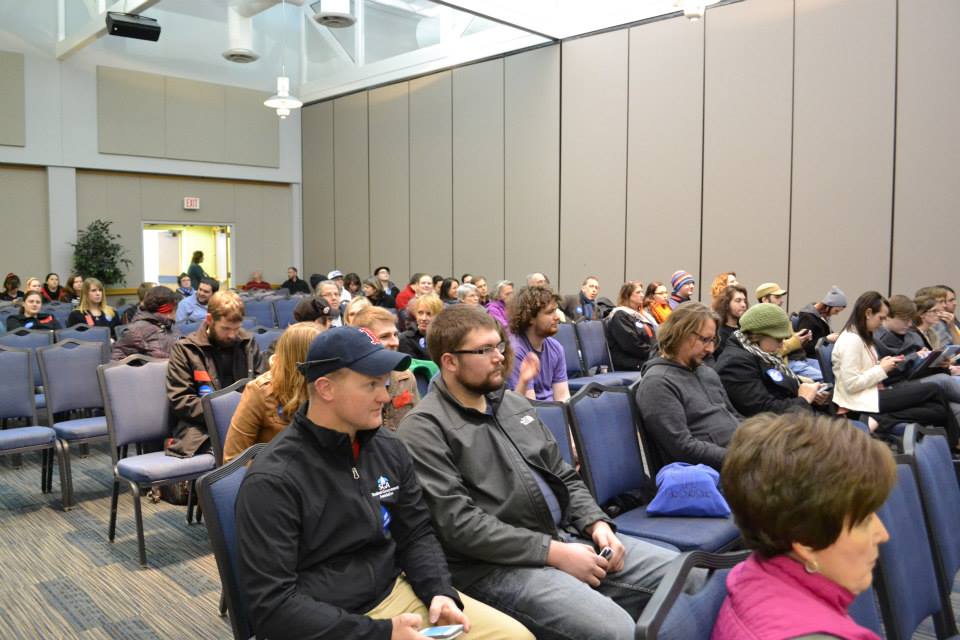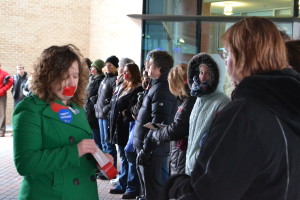The Faculty Senate passed a statement opposing House Joint Resolution-6 (HJR-6) Dec. 13.
HJR-6 is an amendment that, if passed, would permanently define marriage as a bond between a man and a woman and would remove protections under current Indiana law for same-sex couples.
Assistant Professor of Philosophy Garret Merriam, who introduced the topic at the Nov. 8, meeting, and Senate Vice Chair Jason Fertig collaborated on two statements.
Statement A, which passed, reads as follows: “The Faculty Senate at the University of Southern Indiana recognizes the controversial nature of House Joint Resolution-6. While we respect the differing opinions surrounding it, we believe this bill is not consistent with the best interests of the faculty, staff and students of USI. To attract and retain the most talented personnel, as well as to promote our expressly stated values of diversity, inclusion and understanding, USI needs to foster an environment that welcomes everyone, regardless of sexual orientation or marital status. These values are already reflected in our policy towards same-sex domestic partners. Both the policy and the underlying values are threatened by HJR-6. Accordingly, the Faculty Senate opposes the adoption of House Joint Resolution-6, and we encourage both the administration at USI and the Indiana General Assembly to do the same.”
Statement B reaffirmed USI’s and the Senate’s commitment to diversity and equality, but maintained that it is not the Senate’s place to weigh in on political matters.
Eight senators voted for Statement A, three voted against it, two abstained and one was absent.
Marian Yoder, senior psychology major, attended the meeting and was happy with the turnout, but conflicted about how the decision was made.
“I’m very happy to see everyone who came out,” Yoder said. “But I’m disappointed in how they (the senators) interacted with each other.”
She said the senators were unprofessional.
“I thought they were rude,” Yoder said. “They were taking jabs at each other. There was a lot of eye-rolling.”
The vote didn’t come before all of the senators had a chance to express their opinions, many of which had prepared written statements.
“I do not see my actions or those of this body in making a resolution regarding HJR-6 as engaging in political activity – I agree the Faculty Senate should not engage in political actions,” said Peter Cashel-Cordo, economics professor. “The basic principle before us is not a political issue, it’s a human rights issue.”
Assistant Professor of Engineering Brandon Field made it clear he did not think the Senate should make a statement regarding the resolution at all.
“Because everyone else is is not a valid enough reason for doing anything,” Field said. “If they (the Indiana Legislature) are not going to listen to IU and Purdue and all of the rest, they’re not going to listen to just us.”
Merriam provided numbers with his statement, pointing out that 56 of the 59 College of Liberal Arts faculty members believed the Senate should oppose HJR-6.
“The job of the faculty, of course, is to educate students,” Merriam said. “How can we possibly do that if we do not stand with them and do what we can to protect them from discrimination?”
Indiana University, Purdue University, Ball State University, DePauw University, Wabash College, Butler University, the University of Indianapolis and the University of Evansville, among others, have come out against the proposed amendment.
The Evansville City Council and Evansville Mayor Lloyd Winnecke also spoke out against the bill.
“Their actions in concert with ours may indeed have an impact,” Merriam said.

Before Chair Mary Hallock Morris read the two statements in front of a large group of students, faculty and community members who attended the meeting in Carter Hall, Fertig abruptly motioned to close the meeting.
“That was uncalled for,” Morris said.
During his statement, he apologized, and then made a second motion to pass Statement A around the room, allowing for individuals to sign it if they wanted to.
“Individually, as professors and as people, we will voice our opposition the way it’s supposed to be done,” Fertig said. “I don’t believe that we’re the super pack here. This is just not the role of the Faculty Senate.”
He urged senators to not vote out of fear.
“If we cast any vote but condemning HJR-6 – that’s wrong, and to me that doesn’t show that we really care. That shows that we’re afraid,” he said.
Fertig said he would oppose HJR-6, he just doesn’t think it’s the Senate’s job to do so.
Assistant Professor of Health Services Ethel Elkins seconded Fertig’s motion to have individuals sign Statement A, resulting in a vote. It did not pass.
Assistant Professor of Psychology Amie McKibban, who organized a silent stand-in prior to the meeting, said she was pleased with the result and hopes to see higher administration make the next move.

“It was a great turn-out, especially considering it’s a Friday evening and it’s finals week,” she said.
Nearly 100 students, faculty and community members stood arm-in-arm under the University Center Bridge as Senators made their way to the meeting. Some individuals placed red tape over their mouths to symbolize what it’s like to silence an entire group of people.
President Linda Bennett made a statement following the meeting.
It reads as follows: “If higher education is to educate for citizenship, the university campus must be a place of open dialogue and even debate on the important issues of the day. The USI Faculty Senate has engaged in a wide-ranging discussion about HJR-6 and its implications, as well as about the role of a public university in the political realm. This discussion has highlighted the diversity of views and I congratulate the faculty senators on the civility of their process. In a democracy no single voice represents all opinions, nor should it.”
The proposed amendment could be placed on the 2014 general election ballot. It will be discussed in the Indiana General assembly’s legislative session in January.






